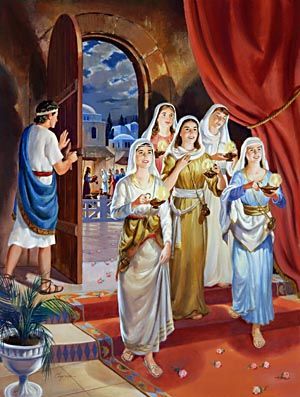To accompany your Come Follow Me study for November 17-23
In addition to reading these two sections, you may enjoy reading any or all of the following:
- Chapter 53: Doctrine and Covenants 133 (churchofjesuschrist.org)
- Chapter 54: Doctrine and Covenants 134–36 (churchofjesuschrist.org)
- Of Governments and Laws (churchofjesuschrist.org)
- Joseph Smith’s Revelations, Doctrine and Covenants 133 (churchofjesuschrist.org)
- Joseph Smith’s Revelations, Doctrine and Covenants 134 (churchofjesuschrist.org)
You may also enjoy the following video:
If you would like a Kahoot game related to these sections which you could use with your family or your class, or which you could play or learn from individually by converting it to a “Challenge” version, click here https://create.kahoot.it/share/doctrine-and-covenants-133-134/1564d8fa-2e7c-453e-a4b4-700d3d742f6b. To use it with a group, after clicking on this link, you will need to log into Kahoot, creating a free account if you have not done so previously, then click on the blue “Host Live” button or the gray “Assign” button, depending on how you wish to use the Kahoot. Some of the Kahoot questions may presuppose that the player has read through the suggested answers to the following Points to Ponder and at least has browsed the Institute student manual as well.
Points to Ponder in Doctrine and Covenants 133-134
1. An “appendix” usually follows the main text of a book, but the “Appendix” to the D&C is followed by five other sections and two official declarations. Why then was it termed the “Appendix”?
2. Which other D&C section is most like D&C 133 in its spirit and purpose?
3. How would you answer the charge that D&C 133 is little more than a stringing together of quotes out of the Bible?
4. What do you consider the most personally currently applicable ideas from D&C 133? (Give the reference which stimulated each idea.)
5. What part of the prophetic picture put forth by D&C 133 would appear to be out of chronological order? Why do you think so?
6. What would you guess the “rich treasures” might be which the lost tribes will bring to the children of Ephraim?

7. D&C 134 was apparently authored by
a. Joseph Smith b. Oliver Cowdery c. W. W. Phelps d. Sidney Rigdon
8. How might 134:1 be reworded to make it more accurately convey what was meant?

9. What is probably the least currently applicable verse in 134?
10. If you hear someone breaking into your house and you discover the phone line has been cut, is it okay, according to D&C 134, to take the law into your own hands? What verse supports your answer?

11. Is there anything improper in having “In God We Trust” on our money and having prayers at governmental functions, according to D&C 134?

12. What does D&C 134 say about the compatibility of socialism or communism with the gospel?
13. In plain English, what responsibilities does the average citizen have to be involved in politics, according to D&C 134?

14. Would Latter-day Saints ever be justified in participating in a revolution, according to D&C 134?

15. What law enforcement responsibilities does D&C 134 say the average citizen has?

16. Would it be appropriate for a Church membership council to impose a fine on a wayward member as part of the conditions of his repentance and reinstatement to full fellowship in the Church?
Possible Answers to Points to Ponder in Doctrine and Covenants 133-134
1. An “appendix” usually follows the main text of a book, but the “Appendix” to the D&C is followed by five other sections and two official declarations. Why then was it termed the “Appendix”?
This was the “Appendix” to the 1833 edition, but there have been several items added since which have been put later in the D&C, perhaps because they were written later or were deemed to be even more of a postscript than D&C 133 was.
2. Which other D&C section is most like D&C 133 in its spirit and purpose?
1
3. How would you answer the charge that D&C 133 is little more than a stringing together of quotes out of the Bible?
You could likewise say a temple was no more than the putting together of familiar bricks, mortar, and wood, but the effect would be no less beautiful. Section 133 is much more than a stringing together of Biblical passages, but it does cite many such passages and helps us understand how ancient prophecies are to be fulfilled in this last dispensation.
4. What do you consider the most personally currently applicable ideas from D&C 133? (Give the reference which stimulated each idea.)
Your choice. I might suggest the following:
- “Go ye out of Babylon”–i.e., be different from the world (v. 5)
- “Prepare ye the way of the Lord”–there is a lot of work to do for us to get the world ready for the Second Coming (v. 17)
- “Speak often one to another”–there is great value in our meeting together and sharing our testimonies and insights with each other (v. 6)
5. What part of the prophetic picture put forth by D&C 133 would appear to be out of chronological order? Why do you think so?
Probably verses 26-34, speaking of the return of the Ten Tribes, which is discussed after earlier verses relating to the Second Coming, but which will apparently actually occur before that time. Otherwise, there would be no “enemies” left around to become a prey to them.
6. What would you guess the “rich treasures” might be which the lost tribes will bring to the children of Ephraim?
Probably their scriptures, including the record of the ministry of Jesus Christ among them following His resurrection. It is hard to think of anything else they could bring of comparable value.
7. D&C 134 was apparently authored by
a. Joseph Smith b. Oliver Cowdery c. W. W. Phelps d. Sidney Rigdon
8. How might 134:1 be reworded to make it more accurately convey what was meant?
“We believe that the principle of government was instituted ….” or “We believe some governments were instituted ….” We would certainly not suggest that all earthly governments have a divine origin.
9. What is probably the least currently applicable verse in 134?
I would suggest v. 12.
10. If you hear someone breaking into your house and you discover the phone line has been cut, is it okay, according to D&C 134, to take the law into your own hands? What verse supports your answer?
Yes. V. 11 upholds the right of self-defense and defense of property.
11. Is there anything improper in having “In God We Trust” on our money and having prayers at governmental functions, according to D&C 134?
D&C 134 certainly doesn’t say so. In v. 9 it says that a mingling of church and state would be improper if it favored one denomination over another, but all religions presumably claim to trust in God, and saying so on our money causes harm to no one, nor does a prayer at a governmental function.
12. What does D&C 134 say about the compatibility of socialism or communism with the gospel?
V. 2 highlights the importance of each individual’s free exercise of conscience and the right and control of private property, which would be severely restricted under socialism or communism.
13. In plain English, what responsibilities does the average citizen have to be involved in politics, according to D&C 134?
V. 3 says we all have an obligation to help find and support good candidates for office.
14. Would Latter-day Saints ever be justified in participating in a revolution, according to D&C 134?
According to v. 5, if and only if their government ceased to protect them in their “inherent and inalienable rights.” The Book of Mormon makes clear that the Lord did justify and support the revolutions of several of the American nations against their mother countries in Europe.
15. What law enforcement responsibilities does D&C 134 say the average citizen has?
Verse 8 says we all “should step forward and use [our] ability in bringing offenders … to justice.” That would at the very least include calling the police when we become aware of a crime in progress or the identity of someone who has committed a crime and cooperate with the police in their apprehension.
16. Would it be appropriate for a Church membership council to impose a fine on a wayward member as part of the conditions of his repentance and reinstatement to full fellowship in the Church?
D&C 134:10 says no.
